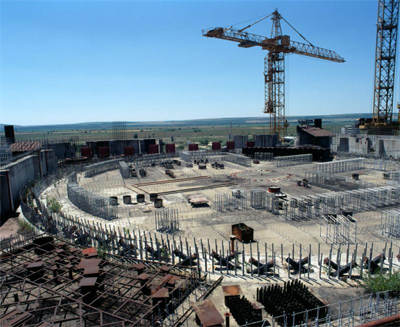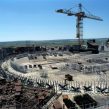
Bulgarian Socialists Vow to Strengthen Economic Relations with Russia
Publication: Eurasia Daily Monitor Volume: 10 Issue: 172
By:

The Bulgarian government intends to intensify its economic relations with Russia, according to Socialist party leader Sergey Stanishev. “This is a way for our country to develop as a modern and technologically advanced economy,” Stanishev told the annual gathering of Bulgarian Russophiles in early September. Evidently, the first step to intensifying economic relations with Russia will be to help Russian energy interests in Bulgaria. Stanishev was quick to assure his audience that the Russian-led South Stream natural gas pipeline and the Rosatom-constructed nuclear power plant (NPP) at Belene (terminated by the previous government) are important projects, which the ruling Socialist-led coalition would continue to develop despite opposition. Although the Belene NPP was cancelled for lack of economic feasibility, Stanishev believes that the expensive nuclear plant would place Bulgaria among the highly developed and technologically advanced countries in the world (Dnevnik.bg, Dnes.bg, Mediapool.bg, Offnews.bg, September 7).
On September 24, the Socialists again expressed their staunch support for the construction of Bulgaria’s second nuclear power plant on the Danube River. “The Bulgarian Socialist Party [BSP] has a unanimous stance on Belene—Belene is necessary for Bulgaria,” BSP legislator Tasko Ermenkov told bTV on September 24. He announced that the Socialists are preparing a new analysis of the nuclear plant project in an attempt to build consensus among lawmakers, thus dismissing the unfavorable findings of the HSBC assessment from 2012 (bTV, September 24).
The new Bulgarian Prime Minister Plamen Oresharski hinted immediately after taking office on May 29 that the Belene NPP project might be revived (BNT, May 30). It seems that four months after returning to power, the Socialists are determined to restart the Belene NPP despite economic logic and regardless of daily anti-government protests for the last three and a half months.
The Russian-Bulgarian nuclear power project was scrapped in March 2012 by the center-right government of Boyko Borisov after a thorough revision of all Russian energy projects in Bulgaria. The planned oil pipeline from the Black Sea port of Burgas to the Aegean port of Alexandropoulos was abandoned in December 2011 as economically unfeasible and environmentally hazardous. The cancelation of the nuclear power plants at Belene prompted the Socialists to call for a referendum, which took place on January 27, 2013. The poll failed to produce a valid result, because of the low turnout. Consequently, the parliament made a decision on February 27, 2013 to cancel the project. To resume construction, the Socialists will need to secure 121 votes in parliament—currently they have 120 seats together with their junior coalition partner, the ethnic Turkish Movement for Rights and Freedoms (MRF). Obtaining the support of the ultra-nationalist Ataka would not be difficult.
The motion to reopen Belene will probably pave the way for Rosatom’s subsidiary Atomstroyexport to drop the lawsuit for one billion euros ($1.35 billion) against the Bulgarian National Electric Company (NEC), which it filed with the International Court of Arbitration in Paris. The NEC had contracted Atomstroyexport to build two 1,000-megawatt (MW) reactors for the Belene NPP. After the project’s termination, Atomstroyexport claimed damages of $1.35 billion from Sofia for unpaid work and missed profits. Rosatom officials have openly stated that if the project were restarted, they would withdraw the claim (Dnevnik, June 5, 7).
Although the requested amount is significant, the new Bulgarian government does not seem to be preparing for a serious court battle. The New York–based law firm White & Case, retained by the previous government to defend Bulgaria’s interests, is concerned that the Bulgarian authorities have not yet recruited experts and provided witnesses. In a letter to the Minister of Economy and Energy Dragomir Stoynev, the law firm states that prolonged delays could result in Bulgaria losing the case and could threaten the NEC’s assets (Capital, novinite.com, September 18).
“The Socialist party has never before expressed such a flagrant support of the Belene NPP, to the extent of undermining the legal dispute. This will affect the lawsuit outcome,” asserted former Energy Minister Delyan Dobrev (bTV, September 24).
Out of three major Russian energy projects in Bulgaria, the previous government of Boyko Borisov supported only the South Stream natural gas pipeline, but his cabinet simultaneously promoted the alternative Nabucco project and later its modification, Nabucco-West. However, Nabucco is no longer a prospect for Bulgaria, following the decision of the Shah Deniz Consortium to select the rival Trans-Adriatic Pipeline (TAP) for transferring gas from Azerbaijan to Europe via Greece and Albania.
Nevertheless, successful negotiations between Bulgaria and Azerbaijan in the past three years secured Bulgaria a contract for 1 billion cubic meters of Caspian gas per year—to be delivered via an interconnector with Greece. The contract was signed between the Shah Deniz Consortium and Bulgargaz in Baku on September 19 for a period of 25 years. The first deliveries will start in early 2019 (Bulgarian National Radio, September 19; standartnews.bg, September 20).
Although Bulgaria will still rely on Russian gas for two-thirds of its gas supplies, the contract for Caspian gas transiting through the Southern Gas Corridor (across Azerbaijan, Georgia and Turkey) is the first real diversification of natural gas sources and gas transport routes. This development will change the dynamics of energy supplies in Bulgaria as a country that currently depends on Russia for more than 90 percent of its gas consumption. It will also change the balance between the external actors in Bulgaria by weakening Russia’s position and allowing the Kremlin less room for political influence. This, in turn, will weaken Kremlin supporters among the Bulgarian Socialist leadership.




